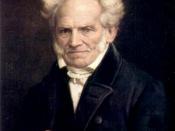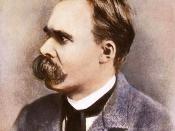In this essay I aim to examine Nietzsche's concept of the Eternal Return and show how it is fundamentally linked to his other main ideas in Thus Spoke Zarathustra; namely; the Superman and the Will to Power. I will do this by examining the Eternal Return as it appears in a number of Nietzsche's works as well as concentrating on the role of the Eternal Return in relation to the Superman and the Will to Power in Thus Spoke Zarathustra itself. I will also recourse to a number of secondary texts in order to gather a range of views on the subject (see bibliography for detailed references).
In 'Nietzsche's Case', Heidegger is cited as claiming; 'Nietzsche's fundamental metaphysical position is captured in his doctrine of the Eternal Recurrence of the same'. What is the Eternal Return? Nietzsche's ideas on the concept appear first in 'The Gay Science':
The greatest weight: - What if some day or night a demon were to steal after you into your loneliest loneliness and say to you: 'This life as you now lived it and have lived it, you will have to live once more and innumerable times more; and there will be nothing new in it, but every pain and every joy and every thought and sigh and everything unutterably small or great in your life will have to return to you, all in the same succession and sequence - even this spider and this moonlight between the trees, and even this moment and I myself.
The eternal hourglass of existence is turned upside down again and again, and you with it, speck of dust!'
... The question in each and everything "Do you desire this once more and innumerable times more?" would lie upon your actions as the greatest weight. Or...


